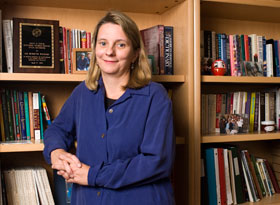  |
| HOME | THIS ISSUE | CALENDAR | GRANTS | BACK ISSUES | < BACK | NEXT > |
New dean of students reaches out to students, campus communityby Richard Veilleux - September 12, 2005
|
||||
|
It didn’t take long for UConn’s new dean of students to decide what would be the most important part of her job. It was right on her door. “My title includes the words ‘of students’,” says Lee Williams, who arrived in Storrs Aug. 1. “My job is to see campus life through the eyes of students. Are we doing all we can to provide these students with the best possible educational experience?” Although she has only been in Storrs for a little more than a month, Williams says she has some ideas about how to give the students more, starting with being proactive. A dean of students’ job at many campuses focuses on crisis management, she says. “I want to be proactive as well, not just reactive. “That’s what attracted me to UConn – the chance to use the position’s influence for advocacy, community development, and building partnerships and collaborations across campus,” she says. Williams, a long-time features editor and a regular contributor to About Campus, the key trade journal for student affairs professionals, has served in a range of positions during her 18-year career. Most recently she was director of Watauga College at Appalachian State University, where she was responsible for overall management of the school’s flagship freshman program, a residential learning community. She also was overall director of the university’s residential learning communities program, and was responsible for developing a new living-learning center. The academic flavor of her background colors the way she looks at her new role. “The perception is that ‘dean of students’ is the name of an office, not a person,” she says. “We have to reshape that perception across campus, so people recognize and connect with what I think is an important job – partnering, connecting, reaching out to students – not just waiting for them to come to us.” Williams reached out Sept. 2, attending the football team’s home opener and mingling with students and alumni in the parking lot before the game. Last week, she helped match people wanting to help victims of Hurricane Katrina with some of the 25 students who enrolled at UConn after their schools in the New Orleans area were closed following the floods. The students, most of them previously registered at Tulane University, were registered, assigned dormitory space, provided with identification cards, and given a brief UConn orientation. Her interaction with the displaced students reflects Williams’ philosophy. “Students have to feel they belong,” she says. “They have to know that they matter, are respected, are free to take intellectual risks, and that they have partners in learning and are part of a community that cares about them.”
Williams also says students have to learn to care about themselves, too, especially when it comes to campus hot buttons like binge drinking. “The conversation about what’s to be done is largely misplaced among administrators,” she says. “The answer is more with the students, with their peers. Students respond more to the shame and embarrassment they feel among their friends after doing something inappropriate, than to anyone hitting them with a hammer. We have to empower the students to be their own hammers. They have every opportunity to take care of themselves.” An Emergency Medical Technician as well as an educator, Williams says she has taught students at other universities how to recognize when a friend is in trouble, and says that “relocating the conversation” and telling students they have to watch out for friends who make bad decisions can have more effect than telling students that they, themselves, are behaving badly and must stop. “Students look out for one another all the time,” she says. “For every awful thing you hear about, there are 50 students who have made a choice to help friends, and 50 students who choose not to get drunk. Those are the stories we don’t hear.” To that end, Williams, who has worked in student-related capacities for the past 18 years, says her to-do list includes collaborating with other campus departments, especially undergraduate education. “We’ll also be building on relationships that John (Saddlemire) started with the athletics department, the police, and the community when he was dean of students,” she says. Williams, who has written dozens of articles for publication and presented at man conferences, earned her bachelor’s degree at Gordon College in Wenham, Mass.; her master’s degree at Salem State College in Salem, Mass.; and her doctorate at the University of Maryland.
|
| ADVANCE HOME UCONN HOME |

